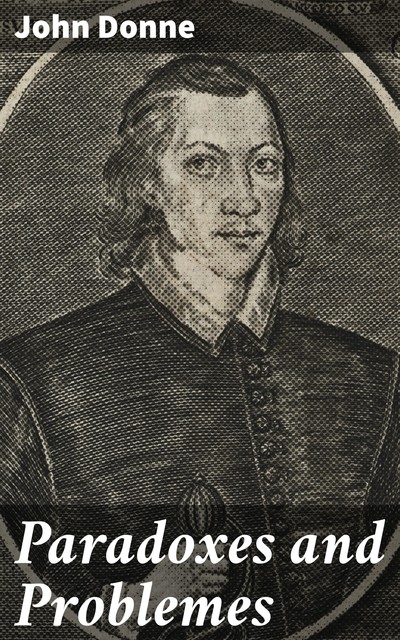Kolačići su neophodni za funkcionalnost internetske stranice i omogućavaju vam da ostanete prijavljeni. Pomoću kolačića prikupljamo i statističke podatke. Oni nam pomažu da saznamo kako koristite Bookmate kako bi mogli poboljšati internetsku stranicu i preporuke za knjige.
Za više informacija, pročitajte našu Politiku kolačića.
Za više informacija, pročitajte našu Politiku kolačića.
Prihvati sve kolačiće
Postavke kolačića
Došlo je do pogreške. Pokušajte ponovo.
John Donne
Paradoxes and Problemes
Dojam
Dodaj na policu
Već sam pročitao/la
Prijavite grešku u knjizi
Podijeli
Facebook
Twitter
Kopiraj poveznicu
John Donne's “Paradoxes and Problemes” is an intricate exploration of the human condition, encapsulated in a series of witty and philosophical musings that challenge conventional thought. Composed in a style characteristic of metaphysical poetry, the text employs paradox as a means to delve into the complexities of love, faith, and existence. This collection reflects the broader literary context of the early 17th century, where intellectual inquiry and poetic experimentation coalesce, revealing not only rhetorical brilliance but also deep existential questioning common in the works of Donne's contemporaries. John Donne, a clergyman and a prominent figure of the metaphysical school, drew upon his own tumultuous life experiences, including personal loss and spiritual struggles, to inform his writing. His engagement with themes of mortality, love, and religious devotion reveals the intricate layers of his character as both a skeptic and a believer. Educated at Oxford and Cambridge, Donne's mastery of language and form echoes the contradictions inherent in his own life, culminating in the profound insights presented in this collection. This book is highly recommended for readers seeking to engage with the depths of human thought and emotion through a lens that marries eloquence with complexity. “Paradoxes and Problemes” invites both scholars and casual readers alike to ponder life'Äôs most perplexing questions, making it an essential addition to the library of anyone interested in metaphysical poetry and philosophical discourse.
više
99 tiskanih stranica
- Vlasnik autorskih prava
- Bookwire
- Objavljeno prvi puta
- 2021
- Godina izdanja
- 2021
- Izdavač
- Good Press
Jeste li već pročitali? Kakvo je vaše mišljenje?
👍👎
fb2epub
Povucite i ispustite datoteke
(ne više od 5 odjednom)


